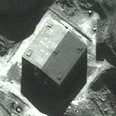
Sources say Syria stonewalls IAEA
UN nuclear watchdogs request access to Dair Alzour site but Damascus officials refuse visit. US suggests IAEA invoke 'special inspection'
Syria has not granted a UN nuclear watchdog request for prompt access to a desert site, effectively rebuffing an appeal for urgent cooperation with a probe into suspected covert atomic activity, diplomatic sources said.
For more than two years Syria has refused to allow UN inspectors to revisit the Dair Alzour site, which US intelligence reports said was a nascent North Korean-designed nuclear reactor intended to produce bomb fuel.
"Apparently the Syrians have not offered anything new in terms of access to Dair Alzour," one Western source said, referring to Syria's response to a letter sent by Yukiya Amano, the head of the International Atomic Energy Agency, last year.
It "didn't provide the IAEA with the answers the DG (Director-General Amano) had been seeking," he added. Another diplomatic source painted a similar picture, without giving detail.
It was not clear whether Damascus had made any other concessions in the dispute, which is expected to be high on the agenda of a March 7-11 meeting of the IAEA's 35-nation governing board, in its reply to Amano.
The IAEA had no comment on the issue and officials Syria's mission to the Vienna-based nuclear agency were not immediately reachable.
Syria, an ally of Iran, denies ever harboring an atom bomb program and says the IAEA should focus on Israel instead because of its undeclared atomic arsenal and the fact it has never joined the nuclear Non-Proliferation Treaty.
Amano's letter to Syrian Foreign Minister Walid Al-Moualem on November 18 was the first time he appealed to Syrian authorities directly, rather than just through his regular reports.
He asked the Syrian government to provide prompt IAEA access to relevant information and locations linked to Dair Alzour.
'Highly unlikely'
The United States has suggested that the IAEA may need to consider invoking its "special inspection" mechanism to give it authority to look anywhere necessary in Syria at short notice.
Amano told Reuters earlier this month that he did not rule out this option, but that no decision had been taken.
Some Vienna-based diplomats have cautioned against using the special inspections tool, as it would escalate the issue at a time of rising tension with Iran, which the West accuses of seeking to develop nuclear arms. Tehran denies the charge.
The agency last resorted to these inspection powers in 1993 in North Korea, which still withheld access and later developed a nuclear bomb capacity in secret.
Last year, the IAEA gave some weight to suspicions of illicit atomic activity at Dair Alzour by pointing to uranium traces found in a 2008 visit by inspectors and saying these traces did not come from Syria's declared nuclear inventory.
The agency wants to re-examine the site and take samples from rubble removed immediately after the air strike to an undetermined location.
Damascus has suggested the uranium traces came with Israeli munitions used in the attack, but the IAEA says this is unlikely, a position underlined by Amano in a Washington Post interview published on Monday.
"One allegation is that the depleted uranium used by Israel in the bombs may be the origin, but we don't think that is likely. It's not totally impossible, but it is highly unlikely," Amano was quoted as saying.
- Follow Ynetnews on Facebook










